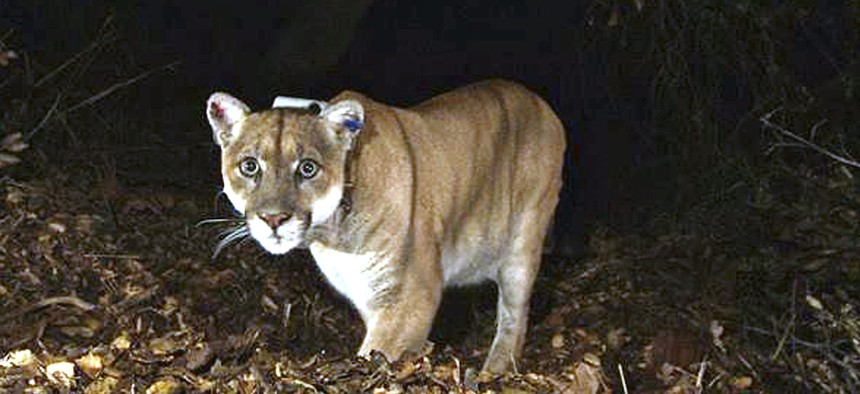Roadkill Dropped During Coronavirus Shutdowns, Study Found

This November 2014 file photo provided by the U.S. National Park Service shows a mountain lion known as P-22, photographed in the Griffith Park area near downtown Los Angeles. Associated Press
The study, which found a 58% decrease in mountain lions killed by cars, examined crash reports involving large animals and traffic patterns in three states.
Reduced highway traffic during stay-at-home orders related to the coronavirus pandemic led to higher rates of survival for mountain lions, deer and other large animals in at least three states, new research found.
The report from the Road Ecology Center at the University of California-Davis, one of four examining traffic changes triggered by shelter-in-place orders, begins by analyzing traffic and crash data from California, Idaho and Maine from early March to mid-April. During that time period when stay-at-home orders were in effect, researchers found the number of vehicles on the roads decreased drastically in each state—by 75% in California, 63% in Idaho and 73% in Maine.
Researchers then used carcass and crash reports to calculate the change in daily collision rates between cars and large wildlife (including mule deer, moose, elk, black bears, coyotes and mountain lions) from the four weeks before stay-at-home orders went into effect through the four weeks after. From early March to mid-April, they found that wildlife-vehicle crashes declined by an average of 34% across all three states. If those traffic patterns continued for a year, between 5,700 and 13,000 large mammals would be spared, according to the analysis.
The drop in traffic was particularly fortuitous for mountain lions in California, which saw a 58% decrease in mortality on roads between the 10 weeks before and after the state’s stay-at-home order. The drop comes at a time “when the state is considering legal protection for the species, in part because of lion-vehicle collisions,” the report says.
Researchers focused on California, Idaho and Maine specifically because those states have “advanced systems for tracking wildlife-vehicle conflict,” the report notes.
“There’s a decrease in impacts to wildlife with the decrease in traffic,” Fraser Shilling, co-director of the Road Ecology Center, said during a July 17 joint meeting of the California Transportation Commission, California Air Resources Board, and California Department of Housing and Community Development. “When you look across the whole United States, this could be up to tens of millions of animals that were not killed that otherwise would have been, due to reduced traffic.”
According to the data, 8.4 large wild animals were killed by vehicles each day in California during normal, pre-pandemic levels traffic, which dropped to 6.6 during the study period—a 21% decrease. About 50 mountain lions would survive if those lower traffic levels continued for a year, researchers estimated.
It’s almost certain that the decrease in large mammal deaths is directly related to the decline in traffic sparked by stay-at-home orders and concerns about the virus, researchers noted, as similar drops did not appear in crash data from the preceding five years.
“Although rates of wildlife-vehicle collisions naturally vary by season, the change from one month pre-stay-at-home orders to one month post-order only occurred in 2020,” the report says, “suggesting that the reduction was associated with the reduction in traffic.”
The results also reflected existing differences in crash patterns across different regions, meaning that areas with higher reported numbers of animal-related collisions—including Portland, Maine and Sacramento, California—continued to have more incidents even as the overall numbers dropped.
“Given the five to nine-fold under-reporting of large animals involved in collisions with vehicles and the lack of systematic reporting of smaller animals killed on roads, the positive impacts we report are likely to be just the tip of the iceberg of reduced deaths of wildlife on U.S. roads and highways,” the report concludes.
Kate Elizabeth Queram is a staff correspondent at Route Fifty and is based in Washington, D.C.
NEXT STORY: Protesters Sue Detroit, City Pledges to Countersue





